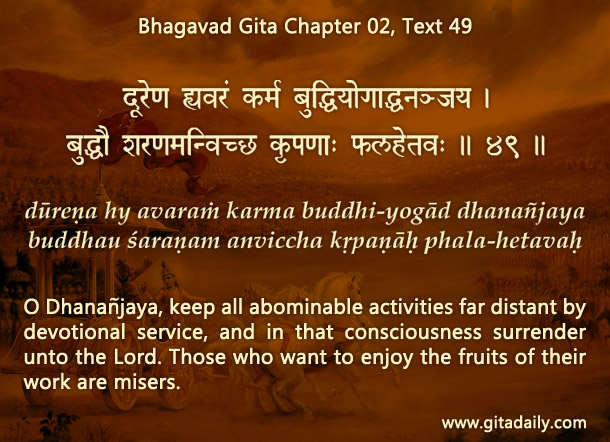Choose the good when it protects you from the bad but not when it deprives you of the best
Suppose we had to choose between a low-quality product for a high price and a high-quality product for a high price. We would naturally choose the high-quality product.
But suppose the context changes. Suppose a third choice comes up, which offers a high-quality product for a low price. If we are too caught in a tunnel vision, then we may not notice the expansion of context; we may stick to the good choice and cheat ourselves of the best choice.
The Bhagavad-Gita (02.49) offers a similar expansion of context when it urges us to give up small-minded work that is attached to worldly results and take up large-minded work that aspires for eternal spiritual realization.
At the start of the Gita, Arjuna saw two options: fight against his relatives to regain his kingdom or avoid bloodshed by forfeiting his right to the kingdom. The Gita expanded his context beyond the material conception of life by explaining our essential identity as indestructible souls. We all are transmigrating through various bodies on a multi-life journey of spiritual evolution. What propels us onward in this evolutionary journey is harmonious action: action that is in harmony with the whole, the all-attractive Supreme Person, whose eternal parts we are. That Whole, Krishna, had manifested on earth to establish dharma. And he wanted Arjuna to fight in the war for establishing dharma.
Concerns for others and the concomitant desire for nonviolence are good; they are way better than self-centered indulgence that is harmful to others. However, concern for others shouldn’t be limited to their bodies, but should also extend to their souls. And if something physically unpleasant is spiritually beneficient, we need to toughen ourselves to do what is best, without settling for the good.
Think it over:
- How does the Gita expand our vision of our choices?
- How did the Gita expand Arjuna’s context?
- For any perplexity confronting you, can you use Gita wisdom to expand your context?
***
02.49 O Dhananjaya, keep all abominable activities far distant by devotional service, and in that consciousness surrender unto the Lord. Those who want to enjoy the fruits of their work are misers.
To know more about this verse, please click on the image
Explanation of article:
https://www.youtube.com/watch?v=9SA7CYIBIYc&feature=youtu.be
Podcast:


Mind percepts the events